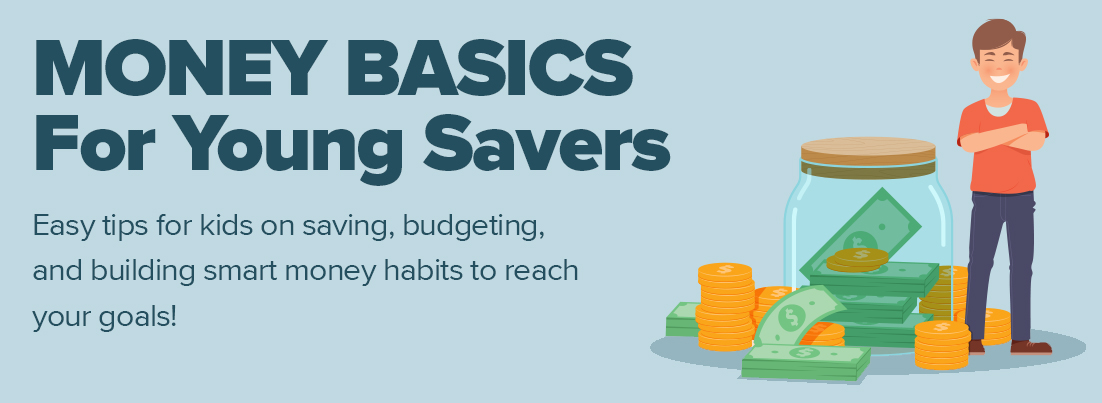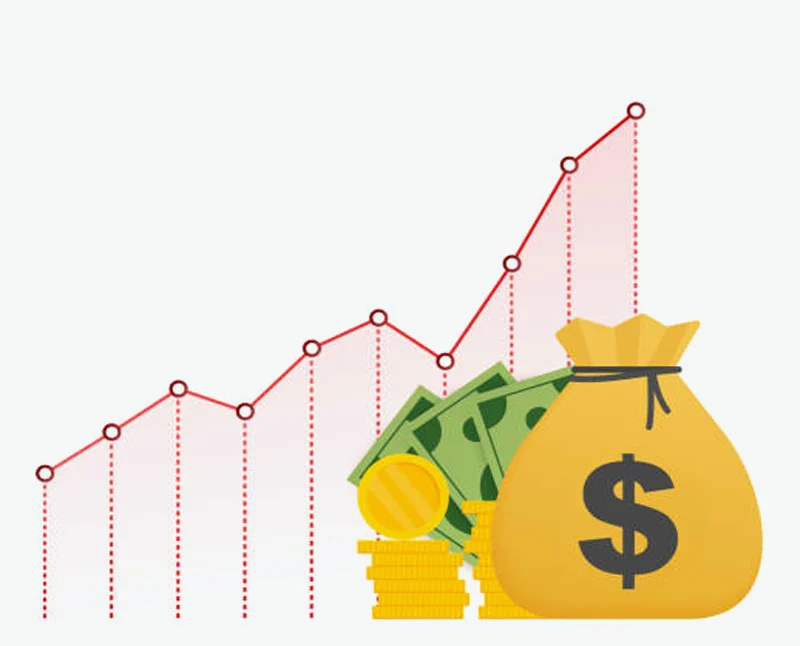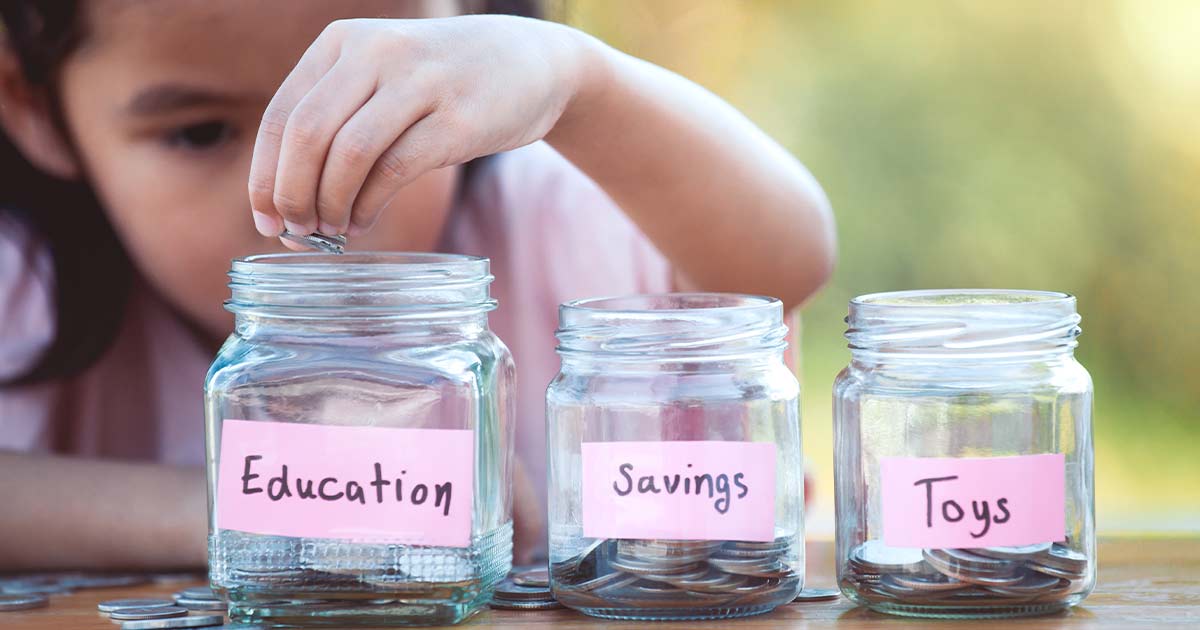

Many People Worry About Saving—Here’s How to Plan for Success
Lots of people feel worried about money, especially when it comes to saving for the future. It can feel hard to know where to start, but the good news is you can start today! Whether you’re saving up for something fun, an emergency, or even just for the future, we’ve got easy tips to help you reach your goals.
Money Matters: Why Financial Knowledge is Key
Understanding money is essential for making smart decisions that build a secure future. Our articles cover everything from budgeting basics to credit tips, designed to help you feel confident and informed. Talking openly about money helps us all make better choices and reach our financial goals.
Why Kids Need to Learn About Money
Despite the value in early financial education, many parents have difficulties starting the aren’t sure how to start the conversation with their families. Here are our top tips about teaching kids about money.
5 Things Kids Can Do to Ensure Financial Success
When it comes to preparing your child for the future, financial literacy is one of the most important skills you can teach them. It’s never too early to teach your children the value of a dollar.
Teaching Kids About Money: Why Your Actions Matter
How often do your kids see you pay bills, talk about savings, or discuss what things cost? As parents, your habits around money don’t just affect you!
MANAGING MONEY
Get Smart with Your Money: Learning to Manage It Like a Pro
Managing money might sound like something only adults need to do, but it’s actually a skill you can start building now—and it’ll help you reach your goals faster! Whether you're saving up for something big or just want to keep track of your spending, learning how to budget and make smart choices will give you more control over what you can buy and do. Think of it like a game where every dollar counts, and the better you play, the more you'll have to spend on the things you really care about.
The Basics of Money: What Every Young Person Should Know
Ever wonder what money really is or why it matters? Find out how money works, how you can earn it, and why smart saving and spending can give you more freedom for the things you love.
How to Budget: Learning to Manage Your Money Like a Pro
Have you ever had to choose between buying something you really wanted and saving for something more important? That’s what budgeting is all about—deciding what you need versus what you want.
Credit 101: The Money Secrets Parents Wish They Knew Earlier
Ever wonder what credit is or why it matters? Credit isn’t just for adults; it’s something that can affect anyone who uses money, especially as they grow older.
See How Your Savings Can Grow Over Time
Ever wonder how saving a little bit can turn into a lot? Our savings calculator is here to show you how! Even small amounts can add up over time if you stick with it. Whether you’re saving for something special or for the future, this tool lets you see how regular deposits can make your money grow.
Use this calculator to find out how much you can earn on a Certificate. Just enter a few pieces of information and we will calculate your annual percentage yield (APY) and ending balance. Click on the "View Report" button to see a detailed schedule of your Certificate's balance and earnings.
Information and interactive calculators are made available to you as self-help tools for your independent use and are not intended to provide investment advice. We cannot and do not guarantee their applicability or accuracy in regards to your individual circumstances. All examples are hypothetical and are for illustrative purposes. We encourage you to seek personalized advice from qualified professionals regarding all personal finance issues.
SAVINGS AND BUDGETING VIDEO RESOURCES
SAVINGS & BUDGETING FAQS
The best way to start saving is by setting aside a little each time you get money, whether it’s from allowance, gifts, or jobs. One of the easiest and most secure ways to do this is with a savings account at Nuvision Credit Union. Start small—maybe 10% of any money you receive—and gradually increase it as you go. A savings account keeps your money safe and separate from what you spend, and you even earn a little extra in interest, meaning your money grows while it’s just sitting there. Saving early helps you build good habits, and you’ll be amazed at how quickly your balance can grow!
Setting financial goals gives you a clear direction and something exciting to work toward. Think about it: having a specific goal, like saving for a new bike, a gaming console, or even a car in the future, turns saving into something rewarding instead of just putting money aside without a purpose. Short-term goals are things you want sooner, like buying a new gadget or going on a fun trip with friends. Long-term goals, on the other hand, are bigger purchases that require more planning and saving over time—like a car or even money for college.
When you have these goals, it makes budgeting and saving feel worth the effort. Every time you add to your savings, you’re one step closer to achieving something meaningful. Plus, having financial goals helps you stay focused on what matters most to you and avoid impulse spending. It’s a great way to learn self-discipline and set up habits that will help you later in life. Remember, saving for something specific feels like giving yourself a gift that pays off in a big way!
A budget is simply a plan for how you’ll spend and save your money, giving you control over where each dollar goes. Think of it like a roadmap for your finances—it guides you, showing you exactly where your money needs to go so you don’t run out before you cover the things you really need.
Budgets help you set aside money for both the fun stuff and the important stuff. For example, if you have $20, you might choose to save $10 for something bigger down the road, spend $5 on something fun now, and use the other $5 for snacks or other small needs. By planning like this, you’re not just tracking your money—you’re deciding what’s most important and making sure you don’t end up with empty pockets when you need it most.
It’s important to remember that a budget doesn’t restrict you; instead, it actually gives you more freedom to make choices. With a budget, you’re the one in charge of your money rather than wondering where it all went. Having a budget in place can also help you reach goals faster, avoid overspending, and make sure you’re always prepared for what’s next!
Interest is like a little reward you get for keeping your money in a bank. When you put your savings in a savings account, the bank pays you interest—a small percentage added to your money. Over time, this extra money grows, which means your savings get even bigger just by sitting there. It’s like earning free money just for being a smart saver! For example, if you save $100 and the bank gives you 1% interest per year, you’ll have $101 by the end of the year. Saving early helps your money grow even faster.
Debt is money that you borrow with an agreement to pay it back over time, often with a little extra called interest. Interest is like a fee for borrowing money—it means you’ll pay back more than you borrowed. While borrowing can be useful for big things like buying a car, a house, or even paying for college, debt can be tricky if not managed well. If you borrow more than you can handle or miss payments, it can quickly add up and make it hard to keep up, creating a cycle of debt that’s difficult to escape.
Being careful with debt means thinking about whether you really need to borrow and, if so, making sure you have a plan to pay it back. Ask yourself, “Is this something I need, or is it something I could save up for instead?” Learning good saving habits early on can help you avoid unnecessary debt later. Remember, the goal is to use debt wisely and only when it’s truly helpful—so you can stay in control of your finances and focus on reaching your goals.









